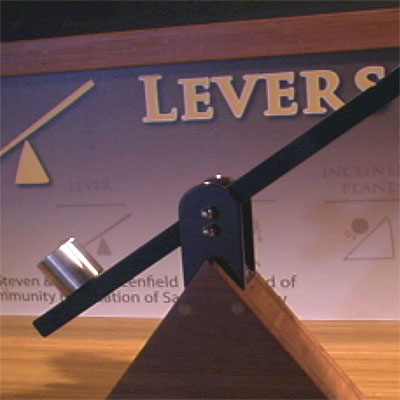 |
 |
Science Minutes DVD
Episode 8: Simple Machines
Focus Question: How do simple machines help us everyday?
Standards
National Science Standard
- Content Standard B: Physical Science (Grades 5-8)
Next Generation Sunshine State Standard
| Grade 5: | SC.5.P.13 Forces and Changes in Motion |
| Benchmarks SC.5.P.13.1, SC.5.P.13.4 |
Vocabulary
Axle a pin or shaft on or with which a wheel or pair of wheels revolves
Gravity a fundamental physical force that is responsible for interactions which occur because of the attraction of the mass of the earth, the moon, or a planet for bodies at or near its surface
Friction the force that resists relative motion between two bodies or objects in contact
Lever a projecting piece, that transmits and modifies force or motion, by which a mechanism is operated or adjusted
Mechanical Advantage the advantage gained by the use of a mechanism in transmitting force; the ratio of the force that performs the useful work of a machine to the force that is applied to the machine
Pulley a wheel used to transmit power by means of a band, belt, cord, rope, or chain passing over its rim
Simple Machine any of various elementary mechanisms formerly considered as the elements of which all machines are composed and including the lever, the wheel and axle, the pulley, the inclined plane, the wedge, and the screw
Wedge a piece of a substance (as wood or iron) that tapers to a thin edge and is used for splitting wood and rocks, raising heavy bodies, or for tightening by being driven into something
Classroom Activity
Supplemental Links
- Simple Machines Learning Site,
http://www.coe.uh.edu/archive/science/science_lessons/scienceles1/finalhome.htm
Further Investigation with Online Activities
- Discovery Education: Technology at Work 1,
http://school.discoveryeducation.com/lessonplans/programs/technologyatwork1/ - Discovery Education: Inventor’s Workshop,
http://school.discoveryeducation.com/lessonplans/programs/invention-leonardoslegacy/
Oral Assessment
Transcript
Kasey
Hey everybody, we are here to talk about things that make our lives a little bit easier. Now I am not talking about iPods, cell phones or even computers, although those modern technologies do help us to live our lives a little bit more comfortably. I am talking about inovations that are so obvious that we don't even thingk about them. I am talking simple machines. You know, like levers, pulleys, wedges and stuff. What, you don't even think you use these things everyday? Well, let me show you a thing or two.
Kasey
Basically, a simple machine is something that gives us a mechanical advantage over gravity and friction.
Screen
A mechanical advantage is a form of special help so that you can spread your energy use out over time to complete a task or overcome an obstacle.
Kasey
Basically, you are saying that when we use a simple machine, we are "cheating" gravity and friction, right?
Screen
CORRECT!
Kasey
Now some simple machines are, well, simpler than others. Take for instance a wedge, can be an axe or a hatchet. Now we can use that wedge to chop wood or even cut an apple in half. So, it would be a whole lot easier to use a wedge to chop this apple in half than it would be to tear it apart with my bare hands.
Kasey
Levers and pullies are other simple machines that help moving things a whole lot easier by lengthening the time it takes to exert the necessary amount of energy. The longer the lever, the longer it takes to exert the same amount of energy.
Kasey
Pullies do the exact same thing. By doubling the distance, we increase the time it takes to raise the weight.
Kasey
Wheels and axels make it easier to move things by overcoming friction
Screen
Friction is the force that two objects exert on one another, making them hard to move.
Kasey
Now take this block for instance. If we place it on a flat surface it is really difficult to move because there is a whole lot of friction. Now if take that block and place it on top of rollers or wheels it's a lot easier to move because those wheels are helping us to overcome friction.
Kasey
Now I am sure you have seen people pushing their cars when they run out of gas. Imagine pusing your car if you didn't have any wheels. That's a whole lot of friction.

